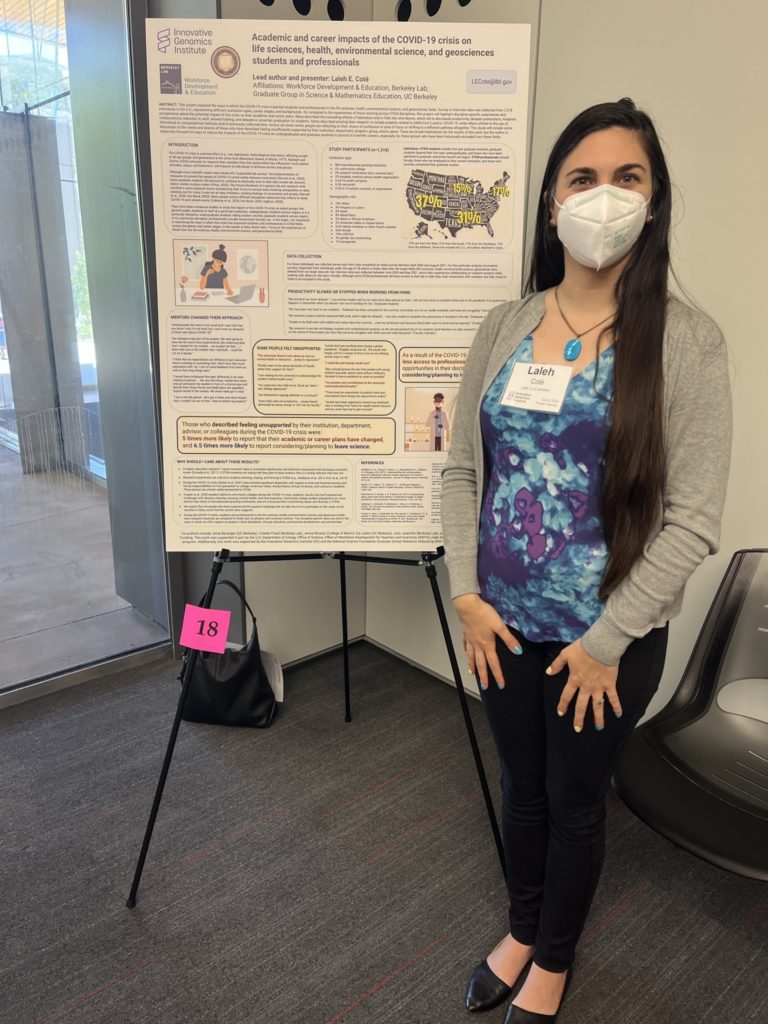
WD&E STEM Education Specialist Laleh Coté stands with her poster at the Innovative Genomics Institute.
On July 8, 2022, WD&E STEM Education Specialist Laleh Coté presented a selection of her dissertation research during the Innovative Genomics Institute (IGI)’s poster session. Coté has 11 years of professional experience working in science education at Lawrence Berkeley National Laboratory (Berkeley Lab). In addition to her role at WD&E, Coté is also a doctoral candidate at UC Berkeley’s School of Education, where she works with Dr. Anne Baranger on educational research studies. Coté’s research includes studies about the ways in which undergraduate students learn about science and STEM careers through research experiences, with a special focus on teaching and mentoring practices. During the IGI’s poster session, Coté shared several preliminary findings from her dissertation research about the impacts of the COVID-19 crisis on STEM students and professionals. Between April 2020 and August 2021, she and her research associates surveyed over 2,000 STEM students and professionals from around the country about the personal, academic, and professional impacts of the COVID-19 pandemic. She and her team also conducted interviews with a smaller number of people whose mentor-mentee research collaborations were transitioned from an in-person to a virtual format.
While Coté is currently in the process of analyzing her data, she was able to discuss several preliminary findings with poster session attendees. Her data set includes information about people in all STEM disciplines, but for the purposes of this conference, she focused on a subset of data from more than 1,300 students and professionals in the life sciences, health, environmental sciences, and geosciences fields. As compared to the whole data set, those working in these disciplines commonly reported that their productivity had slowed during the pandemic. Many researchers no longer had easy access to their specimens in labs, while others reported that fieldwork trips had been delayed or canceled altogether. Many professionals commented that they used new methods of communication among their teammates. Among those who serve as mentors to student researchers, some described that the sudden shift to work-from-home culture meant noticeable changes to their mentoring style.
As a result of the COVID-19 crisis, “about 13 percent of [participants] reported that they had less access to the professional development that they needed to advance their career or to take the next step in their academic journey,” Coté explained. Even more concerning, she noted, “12 percent of folks reported that they were planning to leave academia.”
But what Coté found was most striking were the open-ended comments that participants wrote when they were asked, “Related to COVID-19, what information have you received that has been most helpful/unhelpful, in terms of your own studies, work, and/or projects?” Many students and professionals volunteered that they weren’t receiving the support that they had expected. Those participants who described feeling unsupported by their institution, department, advisor, or colleagues during the COVID-19 crisis were 5 times more likely to report that their academic/career plans had changed, and 6.5 times more likely to report that they were considering or planning to leave science than those who felt supported during this time. As a science educator, Coté is troubled by this last result. She believes that this number could be even higher because students and professionals who were the most impacted by the pandemic likely don’t have the time – or desire – to fill out a survey.
Coté believes that it’s important to ask STEM students and professionals about their workplace conditions because more information could help improve retention rates. Most importantly, it can help STEM professionals feel happier and satisfied. “Even though we’re thinking about how to get back to work and be productive,” she emphasized, “if we are not also caring for people in our scientific disciplines, then we may not have a strong STEM workforce in the future.”
Coté’s research provides a special snapshot at a moment when many educators and professionals are considering their next steps. How has the COVID-19 crisis affected this current generation of researchers? How will the chaotic early months of the pandemic ripple far into the future? Coté’s research could help STEM educators and advocates untangle the ways that this crisis has disrupted the culture of science. Her dynamic data complicates the typically still-portrait of laboratory life. Again, she presented just a small set of data at the IGI; she will learn much more in the months to come. She hopes that her findings will bring the stories of people from all across the nation to life. Even more, she hopes that her research will inspire others who might not feel supported by their institution to share their own story. This particular project, Coté concluded, “is really about storytelling, but I think it’s storytelling with a mission.”
–Ingrid Ockert, Marketing Communications Coordinator

